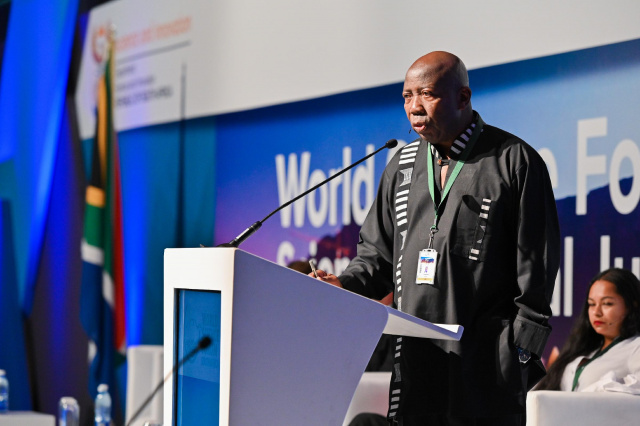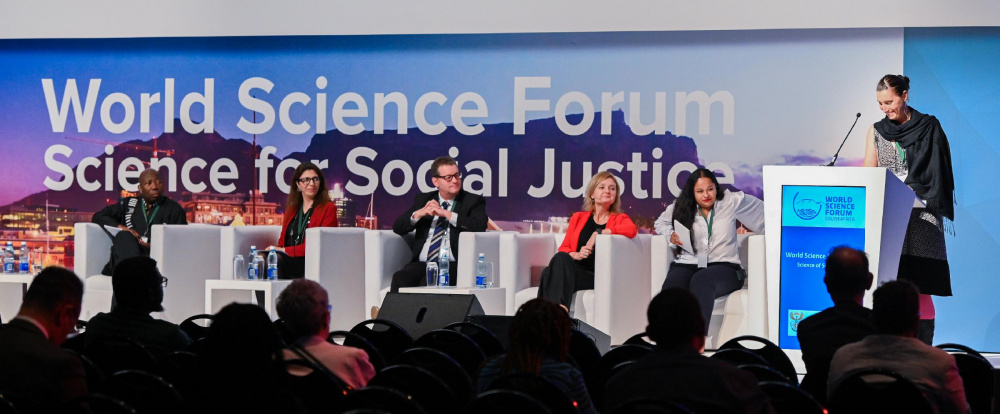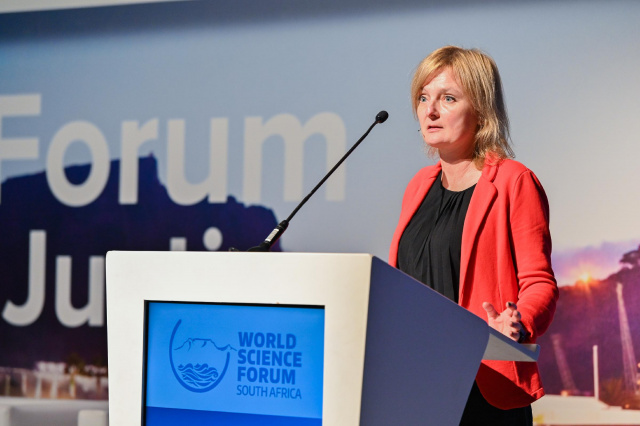World Science Forum – Science for Climate Justice
The Wednesday afternoon plenary session “Science for climate justice – How can science, working with civil society, lead the way in correcting the failure of climate policy?” was one of the most interesting sections of the whole World Science Forum thus far. Africa is the most authentic location for the discussion of this topic because, unfortunately, the low-income states of the continent will be harshly affected by climate change. Therefore, climate justice will be one of the most important scientific and political problems of the coming decades.
Climate change has and will have several negative effects on the African continent, but the most severe of them is certainly declining food security. Millions of people have to face the situation of not having enough food for themselves and their children, and this problem is becoming worse and worse as the climate gets drier and hotter. Without science and without the contribution of civil society, we have no chance of establishing the climate justice which African people so rightfully deserve.
The first speaker of the plenary session was the botanist and agricultural scientist Felix Dapare Dakora, President of the African Academy of Sciences and Adjunct Professor to the University of Western Australia. Professor Dakora spoke about the possible solutions to the negative effects of climate change on agricultural productivity in Africa.
 Felix Dakora Photo: MPI
Felix Dakora Photo: MPI“Food security in Africa is indeed a unique problem. I said so because we already have a situation that appears to be a natural disaster, or ‘disasters’. Africans have to learn and find their own solutions to this problem”, said Professor Dakora in his speech. He added, “To succeed in mitigating the negative effect of climate change, all we need is investments of resources in agricultural research and development. Because once it is done, the carbon will be absorbed and stored in plants and soil, and this knowledge will not be usable in Africa alone. These developed agricultural products will most likely benefit Europe immediately. So I am encouraging people to invest in this field, because this is how we can collectively approach the mitigation of the effect of climate change”.
Climate change is affecting most characteristics and components of the environment. As the physical and chemical aspects of nature change, virtually all factors of life on Earth will have to adapt to this altered environment. Our health is not an exception. One of the most important factors affecting human health is the chemical composition of the environment (the air, the water, and the soil). Ramia Al Bakain, Professor of Analytical and Environmental Chemistry at the University of Jordan, the second speaker of the session, studies the impact of using analytical chemistry for the development of new green methods in water and food management, green techniques for wastewater treatment, and sustainable application in preserving natural resources.
As Professor Al Bakain said in her speech, one of the main problems, from an environmental chemistry perspective, is the difficulty of separating the goals of economic growth from the emission of harmful compounds. “There is a close negative relationship between the rise of mankind and the quality of the environment. Unsustainable economic growth and human activities since the industrial revolution have unfortunately placed a huge pressure on the global ecosystem”, argued Professor Al Bakain. She added, “Another challenge is the failure of human societies in addressing risks. The main reason for this difficulty is the wide gap between what we, scientists, agree on and what reaches the public. We must bridge this gap, because we all, both scientists and the public, are suffering from this situation”.
According to the environmental chemist, another challenge is the difficulty of finding a solution to problems requiring teamwork. “Since the Earth’s climate is an international common good, the benefits of emission reduction achieved in one country will benefit the rest. This is why coordinating international efforts is necessary. But the multiplicity of competing interests and the global scope of the problem unfortunately make the solution more difficult to be achieved”.
The next speaker, Roger Pielke, a professor in the Environmental Studies Program at the University of Colorado Boulder, talked about what the scientific community can do ‘to not make things worse’ regarding climate change. According to the researcher, “the scientific community should have an environmental version of the Hippocratic Oath which says ‘Do no harm’”.

“The climate scenarios, which are the vehicles we use to look into the long-term future, have a lot of historical inequities. These scenarios disregard both the historical responsibility of the global North for carbon emissions, as well as the future energy needs of the global South required to meet developmental goals”, states a quote from Professor Pielke from a paper by Kanitkar et al. (2022). “The burden of climate change mitigation is placed squarely on less developed countries, while developed countries continue to increase their energy consumption unhindered by constraints on the use of fossil fuels”.
According to the scenarios, even though most people get richer over time, the rich of today get richer much more than the poor, “...so inequity extends. Africa is asked to do more than other countries in the mitigation of climate change. There is a debate going on right now about whether there is a ‘carbon space’ for African countries to continue the development with fossil fuels. But the lot of answers out there is ‘Sorry, the carbon party is over’. That is a failure of the imagination in the scenarios, not the reality”.
Perhaps the most influential member of the session panelists was Magdalena Skipper, Editor in Chief of Nature. According to Dr Skipper, for scientists, the sharing of the outcomes of their studies is as important as doing the actual research. “Yes, actions are louder than words, but words have to be spoken first in order for the knowledge to be shared and actions to follow”, she said. The Editor in Chief talked about how climate change – and the climate and social justice as well – has been an editorial theme for Nature for at least three years. “We have been covering climate crisis for a very long time. Three years ago we joined a global journalistic initiative to cover the climate intensively in editorials”.
 Magdalena Skipper Photo: MPI
Magdalena Skipper Photo: MPIDr Skipper emphasised that when we talk about social justice in connection with climate change, we have to look at what social justice means to different constituents of society. “For example, blanket bans on fossil fuels hurt women in lower-income countries. Gender perspective has to be taken into consideration when we talk about the scientific bodies such as IPCC, if the given body itself has sufficient representatives of all the stakeholders in the society. And if it does not, it is something that has to be exposed and written about [in a journal]”.
